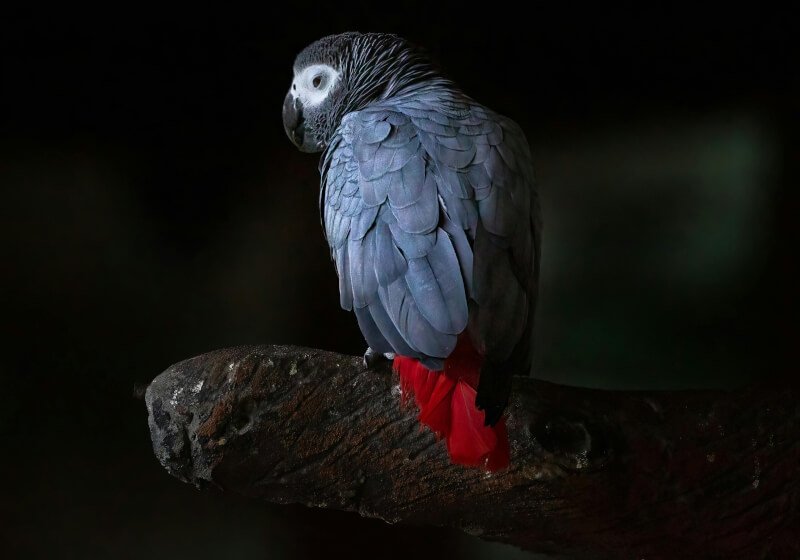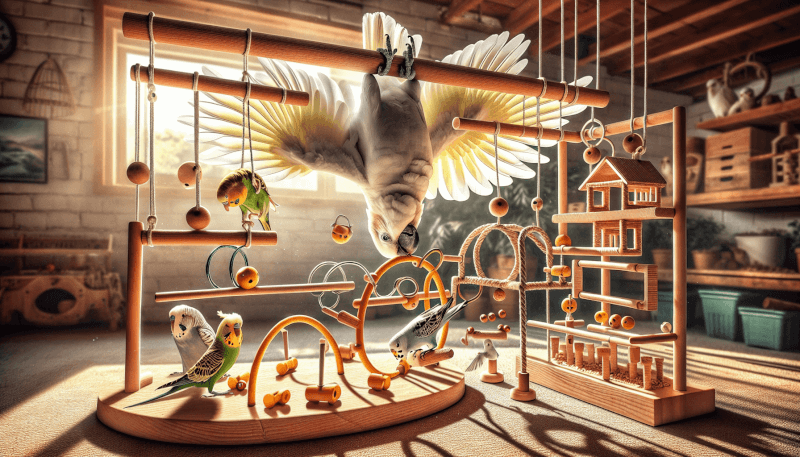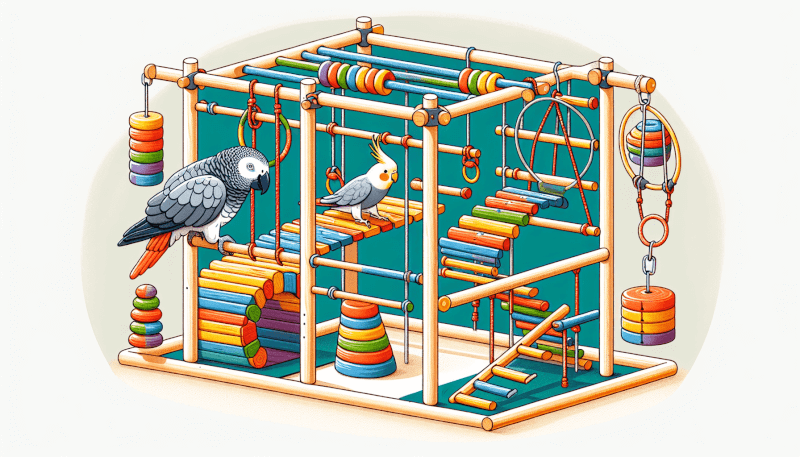Are you a bird owner? If so, it’s essential to understand the importance of exercise for your feathered friend’s overall health. Just like humans, birds need exercise to stay fit and maintain their well-being. In this article, we will explore the best ways to ensure your bird gets enough exercise, providing you with valuable insights and practical tips to promote a happy and healthy lifestyle for your avian companion. Whether you have a parakeet, a cockatiel, or a budgie, these exercises will help keep your bird in great shape and prevent boredom. So, let’s dive in and discover how to keep your bird active and thriving!
Provide Sufficient Cage Size
Having a properly sized cage is essential for promoting your bird’s overall health and well-being. When considering the cage size, you need to take into account the bird’s size and species. Smaller birds like budgies or cockatiels need cages with enough room for them to stretch their wings and move around comfortably. On the other hand, larger birds such as macaws or African grey parrots require even larger cages to accommodate their size.
In addition to considering the bird’s size, it’s important to ensure that the cage provides enough space for stretching its wings and beak. Birds need to exercise these body parts regularly to maintain muscle tone and mental stimulation. Having perches and climbing structures within the cage can also encourage your bird to engage in physical activity, as it mimics their natural behavior in the wild.
Encourage Flight Time
Flight is an essential form of exercise for birds, as it allows them to strengthen their wings and maintain their agility. While keeping your bird in a cage is necessary for its safety, it’s crucial to provide supervised flight time in a safe, enclosed space. This can be as simple as opening the cage door and allowing your bird to fly within a controlled environment, such as a bird-proofed room.
To encourage flight, you can use training techniques such as target training or recall training. By associating a specific command or hand signal with flight, you can motivate your bird to engage in this exercise activity. Offering rewards, such as treats, when your bird successfully completes a flight can also reinforce the behavior and make it more likely to occur in the future.

Provide Interactive Toys
Toys play a vital role in keeping your bird physically and mentally stimulated. When selecting toys for your feathered friend, it’s important to choose those that encourage physical activity. Toys that involve climbing, swinging, or shredding can help simulate the natural behaviors of birds in the wild. Rotating toys regularly is also important to prevent boredom and keep your bird engaged.
In addition to providing toys that promote physical activity, including toys that require problem-solving can be beneficial for your bird’s mental stimulation. These types of toys, such as puzzle feeders or foraging toys, encourage your bird to use its intelligence to obtain its food or treats. This helps replicate the natural foraging behaviors that birds would engage in while searching for food in their natural habitats.
Offer Foraging Opportunities
Foraging is a natural behavior for birds, as they spend a significant amount of their time in the wild searching for food. By providing foraging opportunities in captivity, you can fulfill your bird’s instinctual needs and promote overall well-being. Foraging toys are a great way to stimulate your bird’s natural behaviors and encourage physical activity.
You can hide treats or small amounts of food throughout your bird’s cage or play area to create a foraging experience. Changing the location of these foraging opportunities regularly prevents predictability and keeps your bird mentally engaged. By encouraging your bird to search and work for its food, you are providing an exercise activity that combines physical movement and mental stimulation.

Create Obstacle Courses
Adding obstacle courses to your bird’s exercise routine can be a fun and engaging way to promote physical activity. Setting up a variety of obstacles for your bird to navigate can help encourage movement and exploration. This can include tunnels, ramps, and perches strategically placed around your bird’s play area or in supervised flight spaces.
Allowing your bird to explore and overcome obstacles not only provides exercise but also helps improve its coordination and confidence. Monitoring your bird as it interacts with the obstacle course ensures its safety and allows you to provide guidance and assistance when needed. Bird-safe materials and structures should always be used to avoid any potential harm to your feathered friend.
Encourage Social Interaction
Birds are highly social creatures and thrive on interaction with other birds or humans. Providing opportunities for social interaction is crucial for their mental and emotional well-being. Arrange playdates with other bird owners, where your birds can interact and engage in social behaviors such as grooming or playing together.
Engaging in interactive games and training sessions is another excellent way to promote social interaction. Birds can learn tricks or engage in activities that involve human interaction, such as learning to mimic certain sounds or playing games that stimulate their intelligence. These activities not only provide physical exercise but also foster a strong bond between you and your feathered companion.

Use Positive Reinforcement
Positive reinforcement is a powerful tool for promoting exercise in birds. By rewarding your bird for participating in exercise activities, you can reinforce the behavior and make it more likely to happen in the future. Rewards can include treats, praise, or their favorite toys.
It’s important to avoid punishment or negative reinforcement when it comes to encouraging exercise. Fear or negative associations can lead to stress and anxiety in your bird, which can have a negative impact on its overall well-being. Positive reinforcement creates a positive and enjoyable experience for your bird and helps strengthen the bond between you and your feathered friend.
Offer Regular Out-of-Cage Time
While having a well-sized and stimulating cage is important, birds also need regular out-of-cage time to stretch their wings and explore their surroundings. Allowing supervised exploration outside of the cage provides an opportunity for your bird to engage in natural behaviors and encourages physical exercise.
However, it is crucial to ensure that the environment is bird-safe before letting your feathered friend out. Remove any potential hazards such as toxic plants, open windows, or gaps where your bird could become trapped. Supervise your bird closely during this time to prevent accidents and ensure its safety.

Provide Access to Natural Light
Sunlight is essential for a bird’s overall health, as it provides necessary vitamins and helps regulate their internal clock. Placing your bird’s cage near a window with natural sunlight allows it to experience the benefits of sunlight exposure. However, it is important to ensure that the cage is not exposed to direct sunlight for prolonged periods, as this can lead to overheating.
Consulting an avian veterinarian can help determine the optimal duration and timing of sunlight exposure for your bird, as it can vary depending on the species and individual needs. They can provide recommendations on how to provide the right balance of natural light for your feathered friend’s well-being.
Maintain a Balanced Diet
Exercise alone is not enough to ensure your bird’s overall health. A balanced diet is crucial for providing the necessary nutrients they need to thrive. Offering a variety of fresh fruits, vegetables, and quality pellets is essential in meeting your bird’s nutritional needs.
Consulting an avian veterinarian for specific dietary recommendations is highly recommended, as different bird species have different nutritional requirements. They can provide guidance on portion sizes, specific food items to include, and any dietary supplements that may be necessary to maintain your bird’s health.
In conclusion, ensuring your bird gets enough exercise is vital for its overall health and well-being. By providing a sufficient cage size, encouraging flight time, offering interactive toys and foraging opportunities, creating obstacle courses, and promoting social interaction, you can keep your bird physically and mentally stimulated. Using positive reinforcement, providing regular out-of-cage time, offering access to natural light, and maintaining a balanced diet further enhance their overall health. Remember, a happy and healthy bird is a bird that gets enough exercise!



